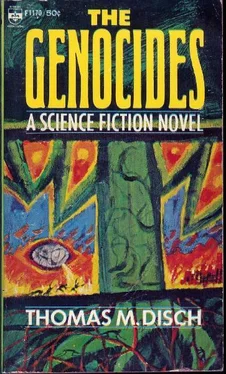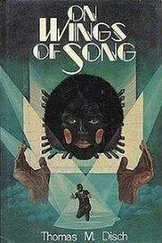Alice Nemerov rescued them from this awkwardness by narrating her own story, which was singularly free of unpleasantnesses, considering. From the very first days of the famine she had stayed at the main hospital, living in the isolation ward. The hospital personnel had traded on its skills and medical supplies and gotten through even the worst times—except, apparently, for that last worst time of all. The survivors were mostly nurses and interns; the doctors had retired to their country houses when, after the failure of the Government, anarchy and famine had governed the city. In the last years, Alice Nemerov had gone about the city, armored in innocence and the certain knowledge that her skills would be a passport among even the meanest survivors, secure also in the knowledge that she had passed quite beyond the point where she need worry about rape. Thus, she had come to know many of her fellow refugees, and she effected their introductions with aplomb and tact. She told too of other survivors and the curious expedients by which they bad saved themselves from starvation.
“Rats?” Jackie asked, trying not to seem overdelicate in her disgust.
“Oh yes, my dear, lots of us tried that. I’ll admit it was highly unpleasant.” Several of her listeners shook their heads in agreement.
“And there were cannibals, too, but they were poor guilty souls, not at all what you’d think a cannibal would be like. They were always pathetically eager to talk, for all of them lived quite alone. Fortunately, I never came across one when be was hungry, or my feeling might be different.”
As the sun mounted to noonday, weariness and sheer contiguity made the others drop their guards and speak of their own pasts. Orville realized for the first time that he was not quite the monster of iniquity that he had sometimes thought himself. Even when he revealed that he had been a foreman on the Government labor crews, his hearers did not seem outraged or hostile, though several of them had been impressed for labor in their time. The invasion had turned everyone into relativists: as tolerant of each others’ ways, and means, as if they were delegates at a convention of cultural anthropologists.
It was hot, and they needed sleep. The breaking down of the barriers of solitude had tired their spirits almost as much as the march had tired their bodies.
The band did post sentinels, but one of them must have slept. The opportunity for resistance was already past before it was realized.
The farmers—their bones as ill-clothed with flesh as that flesh with tattered denim—outnumbered them three to one, and the farmers had been able, while the wolves slept (lambs, might not one better say?) to confiscate most of the weapons and prevent the use of the rest.
With one exception: Christie, whom Orville had thought he might grow to like, had managed to shoot one farmer, an old man, in the head. Christie was garroted.
Everything happened very quickly, but not too quickly for Jackie to give Orville a last kiss. When she was pulled away from him, roughly, by a younger farmer who seemed better fleshed-out than the majority, she was smiling the special, bittersweet smile which was reserved for just such occasions as this.
Lady tucked Blossom into bed that night just as though she were still her little girl. She was only thirteen after all. Outside the men were still going at it. It was a terrible thing. If only she could shut her ears to it.
“I wish they didn’t have to do that, Mother,” Blossom whispered.
“It’s necessary, darling—a necessary evil. Those people wouldn’t have hesitated to kill us. Are you warm under that thin blanket?”
“But why don’t we just bury them?”
“Your father knows best, Blossom. I’m sure it distresses him to have to do this. I remember that your brother Buddy—” Lady always referred to her stepson as Blossom’s and Neil’s brother, but she could never forget that this was a half-truth at best and she stumbled over the word. “—that he once felt the same as you.”
“ He wasn’t there tonight. I asked Maryann. She said he’d gone out to the west field.”
“To guard against the other marauders who may come.” The steady rasping noise outside penetrated the light weave of the summer walls and hung in the air. Lady brushed back a strand of gray hair and composed her features to something like sternness. “I have work to do now, darling.”
“Would you leave the light?”
Blossom knew better than to bum oil to no purpose—even this oil, which had been extracted from the Plant. She was only seeing how far she could go. “Yes,” Lady conceded (for it was not just any night), “but keep it very low.”
Before she lowered the curtain that partitioned Blossom’s bed from the rest of the commonroom, she asked if Blossom had said her prayers.
“Oh, Mother! ”
Lady lowered the curtain without either condoning or reproaching her daughter’s ambiguous protest. Her husband, certainly, would have seen it as an impiety—and punishable.
Lady could not help being pleased that Blossom was not so impressionable (and if the girl had a fault, it was that) to be led too fervently or too fearfully to adopt her father’s fierce, unreasoning Calvinism. If one had to behave like an infidel, Lady believed, it was sheer hypocrisy to pass oneself off as a Christian. Indeed, she very much doubted whether the god to whom her husband prayed existed. If be did, why pray to him? He had made His choice some eons ago. He was like the old Aztec gods who had demanded blood sacrifice on their stone altars. A jealous, vengeful god; a god for primitives; a bloody god. What was the scripture Anderson had chosen last Sunday? One of the minor prophets. Lady shuffled through the pages of her husband’s great Bible. There it was, in Nahum: “God is jealous, and the Lord revengeth; the Lord revengeth, and is furious; the Lord will take vengeance on his adversaries, and he reserveth wrath for his enemies.” Ah, that was God all over!
When the curtain was down, Blossom crawled out of bed and obediently said her prayers. Gradually the rote formulas gave way to her own requests—first, for impersonal benefactions (that the harvest be good, that the next marauders be luckier and escape), then for more delicate favors (that her hair might grow faster so that she could set it in curls again, that her breasts would fill out just a little more, though they were already quite full for her age—for which she gave thanks). At last, snuggling back in bed, these formal requests gave way to mere wishful thinking, and she longed for the things which were no longer or which were yet to be.
When she fell asleep, the machinery outside was still grinding on.
A noise woke her, something woke her. There was still a little light from the lamp. “What is it?” she asked sleepily.
Her brother Neil was standing at the foot of her bed. His face was strangely vacant. His mouth was open: his chin hung slack. He seemed to see her, but she could not interpret the expression in his eyes.
“What is it?” she asked again, more sharply.
He did not reply. He did not move. He was wearing the pants he bad worn all that day and there was blood on them.
“Go away, Neil. What did you want to wake me up for?”
His lips moved, as though in sleep, and his right hand made several gestures, emphasizing the unspoken words of his dream. Blossom pulled her thin cover up to her chin and sat up in bed. She screamed, having only meant to tell him to go away a little louder, so he would hear her.
Lady slept lightly, and Blossom did not have to scream more than once. “Are you having nightmares, my—Neil! What are you doing here? Neil?”
Читать дальше












